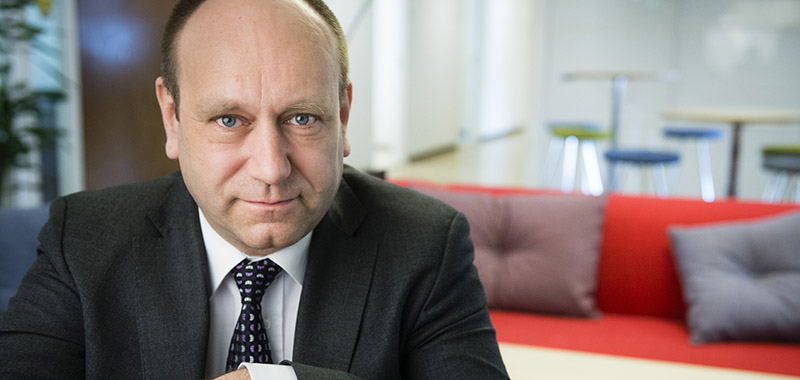Managing Director's report

There was a breakthrough in 2015, globally and in Finland, in how the relevance of responsible business for development was recognized.
The International Conference on Financing for Development, held in Addis Ababa in July 2015, underlined the role of private investment. In September, the world’s nations agreed on sustainable development goals (Agenda 2030), recognizing that the private sector would be needed to achieve them. The Climate Change Conference in Paris in December, which called for large-scale investments in renewable energy and energy savings, noted the utter inadequacy of public funds, particularly in developing countries, and that investments by companies would play a key role.
The debate on Finnish development policy had long recognised the need to promote responsible private sector investments but this was not much reflected in the practice of development cooperation. This suddenly changed in May 2015. The programme of the new government emphasised the role of the private sector in development policies and promised to support business investments in developing countries. In December, Parliament approved the budget that provided more capital for Finnfund.
Although the increase had long been under preparation and had cross-party support, it was unfortunate that it took place at a time of drastic cuts in other development cooperation. This created a public clash. The capitalisation of Finnfund seemed to be happening at the expense of non-governmental organisations engaged in development. An understandable concern for these organisations led many to question the benefits of business investments to development.
For Finnfund, this was an unfortunate situation. Civil society organisations and others involved in development cooperation do important work that we appreciate greatly. Different players often have the same goals but different methods. All are needed.
Traditional development cooperation typically involves building schools and clinics, developing public services, promoting democracy, etc. with financial support from Finland. The idea behind Finnfund’s investments, on the other hand, is to boost productivity and incomes of people in developing countries so that they can themselves finance their own schools and clinics. We also seek to do it profitably, so that the money is not used up but can be constantly recirculated to new projects.
Many private projects have a rather direct impact on the living standards of the poor. With the completion of a solar power plant in Honduras in 2015, more than a million people in various countries already obtain electricity for their homes from power plants constructed with finance from Finnfund. Replacing smoky kerosene lamps with electric light creates cleaner air in the homes and makes it easier for children to study and families to breathe.
An even more obvious link between human conditions and business investments can be found at the UCL pharmaceutical company in Kenya. Thanks to financing from Finnfund, UCL raised the quality of its production to international standards and multiplied its annual output to more than one billion pills. The alternatives for African consumers are often poor or expensive so, even at a cautious estimate, UCL has saved thousands of lives.
The project has not consumed Finnish tax euros. Finnfund sold its UCL shareholding in 2015 and recovered the funds it had invested a decade ago with interest. As frequently happens in business projects, our exit does not mark the end but the next step. In the skilled hands of the buyer, a plant created largely with Finnfund finance will probably produce even more drugs and development impacts.
Business projects also often have indirect development effects. If the aim is to produce coffee or shoes for export or to serve tourists or wealthy segments of the country’s own population, its benefits in reducing poverty are not derived from what is produced but from how production creates jobs and livelihoods, develops exports and broadens the tax base. For a sustainable reduction in poverty, the world needs projects such as these. No country can produce everything that it requires, and exports are necessary to pay import bills.
Employment, income-earning opportunities and decent living conditions should also be offered to those who have been forced to flee their homes and are waiting in a neighbouring country for conditions to improve. Finland grasped this in 2015 when hundreds of thousands of refugees from the conflicts in Syria and Iraq tried to cross the Mediterranean to Europe. Countries in Africa have populations of refugees that are relatively much larger but there is far less international support for caring for them.
If they have no home to return to, most refugees look for opportunities in nearby countries, although in many cases the countries have limited resources. At a time of scarce international support for aiding refugees, it is important for refugees to be able to work and thereby raise their own living conditions. This in turn requires investments in job creation and infrastructure.
Finnfund’s mandate to operate in refugee crisis countries was strengthened in late 2015. In 2016 several solar power plants partly financed by Finnfund will be completed in Jordan. This is a country with an urgent need for extra electricity after a million refugees crossed its borders from Syria and Iraq in a short period of time.
More generally, renewable energy is an important focus for Finnfund. The oil price collapse in 2015 was a challenge but Finnfund’s renewable energy projects withstood it well. Solar power in particular is becoming more competitive as the technology improves and costs fall. Despite a temporary reverse, the direction is from coal and oil to renewable energy, a field where Finland has much to offer. In the more prosperous and stable developing countries there is already good access to commercial finance for renewable energy but, in more challenging markets, development finance institutions have a key role to play.
I would like to thank Finnfund’s customers, staff and other stakeholders for their support in 2015.
Jaakko Kangasniemi
CEO

